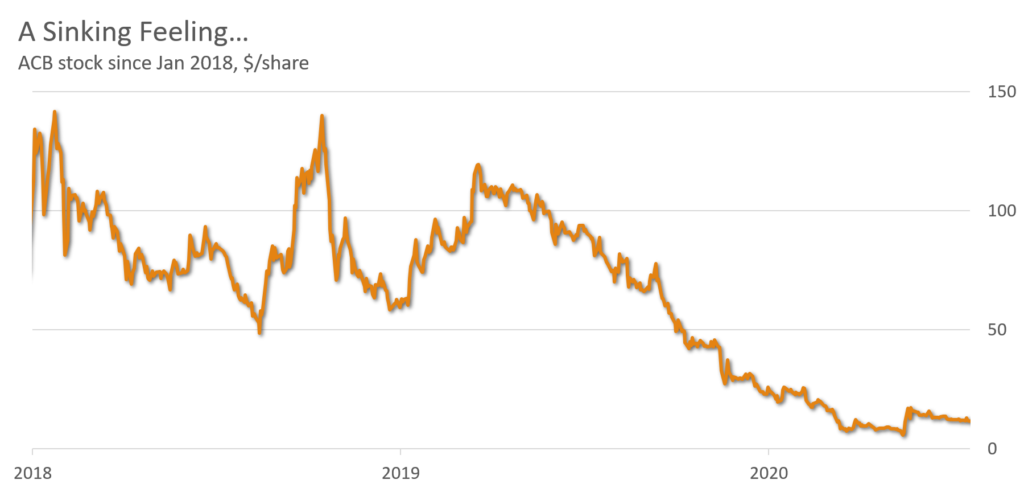On Tuesday, Aurora Cannabis (NYSE:ACB) announced a potentially massive 1.8 billion CAD ($1.37 billion) write-down for Q4. Simultaneously, the Canadian marijuana company announced it has chosen a new CEO, its Chief Commercial Officer Miguel Martin. The market reacted with shock, sending ACB stock down 12% before recovering.

But it’s a trick that other companies have long used.
When struggling companies need to offload past bad decisions, they throw the old CEO under the bus. Hewlett Packard (NYSE:HPQ) famously did that in 2012 when they fired CEO Leo Apotheker while writing off $8.8 billion on its failed Autonomy acquisition. It cleans the slate for the new CEO.
Aurora Cannabis, however, will need far more than blame-shifting to survive. Here’s what Aurora stock investors need from the next CEO.
ACB Stock: The Weakest Link in the Promising Cannabis Industry
Readers will know that I have long eyed the legal cannabis industry. Americans spend almost as much on marijuana as they do on tobacco products, and federal legalization will open the floodgates to legitimate profits.
But Aurora Cannabis remains a terrible company.
For years, the company has overinvested in cultivation while ignoring marketing and sales. There was an implicit assumption that “street” weed had terrible quality; once Aurora created better-quality strains, users would immediately switch over.
They were totally wrong.
ACB management clearly underestimated the illegal market. Not only were “legacy growers” competitive in quality. Their multi-level distribution network also kept costs relatively low. Legacy growers, after all, had competed against each other for decades.
Today, Aurora now produces three times more weed than it can sell and burns through almost 800 million CAD a year. Its 1.8 billion CAD write-off simply represents the legally required recognition of past failed investments. Read more about Aurora’s troubles here.

I’ve warned of such poor business planning in the past — just because you’re in a growth industry doesn’t guarantee success.
So how can the new CEO turn Aurora Cannabis around?
ACB Needs to Look like Juul to Succeed …
… and that’s not a good thing.
Controversial vaping company Juul took the U.S. by storm in 2016. Targeting teens and young adults with colorful ads, the firm grew U.S. sales 640% that year and 800% the next. Nicotine pods in hundreds of flavors popped up from grocery stores to gas stations almost overnight. And young smokers started to get hooked.
At its peak, Juul sold nearly $1 billion of vapes and pods annually, reaching a $38 billion valuation. And by 2019, 27.5% of all high school students reported vaping to some extent.
If Aurora wants to regain its $15.7 billion enterprise value, CEO Martin will have to follow a similar path: marketing cheap, mass-market THC products for a new generation of smokers.
Aurora Stock Needs a Cheaper High
As unethical as Juul’s marketing campaigns may have been, they contained the same elements of other successful “vice” companies: a cheap-to-produce product surrounded by powerful marketing. Alcohol companies also routinely target youth to inspire a new generation of devotees, running ads even during college sports games.
And the worst offenders? Big tobacco. Cigarette companies often gave away free cigarettes in the 70s through the 90s to promote their brand (and get new smokers addicted).
In other words, the value of “vice” companies isn’t in production or taking market share. It’s in marketing to a new audience.
Can ACB’s New CEO Navigate the Cannabis Minefield?
Successful “vice” companies need to live with massive public scrutiny.
Juul’s success, for instance, horrified parents and regulators alike. By early 2020, the FDA had banned most flavored nicotine pods, sending Juul’s market value tumbling to $12 billion.
Yet, if CEO Martin wants to turn ACB into a multi-billion-dollar business, his best bet would be this:
Firstly, develop a cheap THC vape cartridge like Canopy Growth’s 510 thread format devices. There’s no need to fight legacy growers in traditional cultivation when you can leverage your size to create an entirely different product.
Secondly, create an aggressive two-pronged marketing plan aimed at 1) converting existing joint smokers and 2) ethically acquiring new users looking for a safe way to experiment.
Finally, take a more active stance in ensuring the safety and responsibility of its users. “Smoking wet,” or consuming tainted marijuana, has long been a problem in the illegal cannabis industry — legal makers need to prove they can do better for society.
What’s Next for ACB Stock?
If Miguel Martin can achieve these three mileposts, ACB will reward stock holders with 10x-30x returns. Few companies have ACB’s massive potential.
But if Martin fails at any of the three mileposts … then what better way to lose another $1.8 billion?
On the date of publication, Tom Yeung did not have (either directly or indirectly) any positions in the securities mentioned in this article.
Tom Yeung, CFA, is a registered investment advisor on a mission to bring simplicity to the world of investing.
